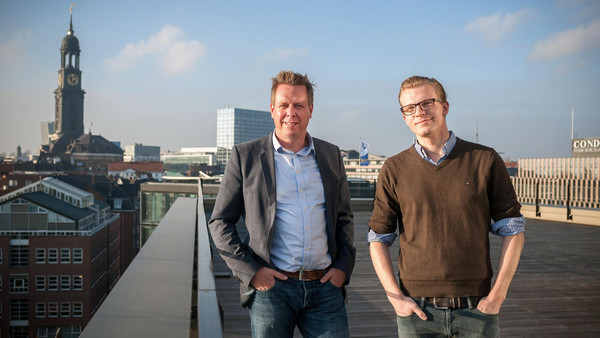
Kreditech: A credit check by social media
By Jeevan Vasagar for Ft.com
The analysis begins with the first keyboard strokes of a borrower seeking a loan on Kreditech’s site, gathering clues about personality and identity — such as whether someone types in their name or pastes it in.
Copying and pasting a name suggests a fraudulent bot rather than a human. A person desperate for money is likely to jump straight to the sign-up page rather than spending time reading the website. Would-be borrowers are asked to share their browsing history, giving the company access to their shopping habits and whether they spend time on websites that might make them a credit risk, such as online gambling.
“What type of friends do you have? We may be able to see whether he has friends who have already repaid a loan to us — that usually is a good indicator.”
Kreditech, a Hamburg-based start-up that offers credit and banking products to people with little or no credit history, has attracted attention from investors including JC Flowers and Peter Thiel. The fintech company’s vision is to build an “Amazon for consumer finance”, expanding to offer products for personal finance management, overdrafts and payment services.
Traditional credit scoring looks to the past and present as a guide to the future. But what would it be like if many data points, from psychometric testing to posts on Facebook or LinkedIn, could be used to build up a more accurate portrait of creditworthiness?
Rene Griemens, chief financial officer of Kreditech, says: “Historic behaviour may be an indicator for the future, but for most people it’s not, because for most people a better indicator is how they are behaving nowadays and how this is likely to develop.”
Instead of focusing on repayment history, Kreditech seeks to uncover a borrower’s “underlying personality” from a richer data set. The company looks at information from social networks, which is voluntarily shared by a loan applicant.
“Social media tells you a lot about the person,” says Mr Griemens, at Kreditech’s office in a building with striking views of Hamburg’s waterfront.
“What type of friends do you have? We may be able to see whether he has friends who have already repaid a loan to us — that usually is a good indicator.”
Social media gives lenders an insight into how an applicant spends their time. A borrower who lives in St Petersburg but spends all his time in bars in Moscow may be high risk, because his location hints that he is spending more time partying than working. Another tool in the pipeline analyses the sophistication of the language a user employs in Facebook posts or tweets. However, if a person declines to share their social media profile, Kreditech will not automatically disqualify them.
Bigger picture
It is not just the volume of data that differentiates online lenders such as Kreditech; the business is also seeking to transform the classical definition of creditworthiness.
Rather than ticking off borrowers against a checklist of requirements such as minimum income and age, the company lets its algorithm map an applicant’s behaviour. Looking for correlations in a wealth of data means there may not be a single “right answer”. Behaviour that might be suspicious in a factory worker — applying for a loan from Hamburg when their job is in Stuttgart — might make perfect sense for someone with an itinerant job.
Establishing patterns of behaviour helps a lender look beyond past defaults; a borrower might have attempted to pay back a previous loan but struggled to do so on a low income.
Mr Griemens acknowledges that even algorithms can be flawed. “The algorithm is only as good as the set of data it has been trained on,” he says.
Kreditech is too small to cause the big banks much anxiety. Its loan book is in the “middle two-digit million euros”, Mr Griemens says. The company, which is lossmaking, estimates its revenues for 2015 at about €41m.
But the opportunity for a company that gets this right is significant. Look at a map of the world shaded according to credit scores and there are large blank spaces. In many countries, significant swaths of the population are not credit scored. Even in countries where every adult has a credit rating, a more accurate portrayal of creditworthiness could open untapped sections of the market.
Although it is based in Germany, Kreditech’s core markets are the Czech Republic, Mexico, Poland, Spain and Russia. In some of these markets, the start-up extends credit to people who might otherwise resort to the grey market of informal lending. The company reckons the total market size for consumer credit worldwide is about €8tn.

Like others who extend finance to borrowers at the margins, Kreditech’s rates are steep. The company charges a standard interest rate of 0.8 per cent to 1 per cent a day on a microloan, which is repayable over 30 days.
The company was founded in 2012 by Alexander Graubner-Müller and Sebastian Diemer, both of whom had worked at the German tech start-up conglomerate Rocket Internet. While at Rocket, the two men looked for a partner to provide financial services to ecommerce customers in emerging markets, but they struggled to find a solution.
Mr Graubner-Müller, who took over as chief executive in November with Mr Diemer moving on to focus on longer-term strategy, says: “Banks were lacking the ability to evaluate this type of customer . . . or credit application processes were not designed to be user-friendly in an online context.”
The new chief executive has the fidgety and mildly impatient look of a bright schoolboy, with blond hair and dark-rimmed glasses. Mr Griemens, whose career spans two decades, has a more relaxed and affable manner. He joined the company in 2013 and his CV includes stints at Citibank in London, McKinsey in Portugal and most recently a boutique bank in Berlin.
The location of Hamburg for the company’s headquarters is down to chance. The two founders were based there at the time and found angel investors locally. The city’s handsome brick architecture and lively clubs and bars make it attractive to staff. Kreditech has a workforce of about 200 worldwide.
Given the number of people worldwide lacking a credit score, it is unsurprising that Kreditech is not the only business trying to apply new technology to assess a borrower’s trustworthiness.
However, Oliwia Berdak, an analyst at Forrester, warns that innovative credit scoring systems have yet to come under pressure. She says: “The problem is that it’s early days, and they haven’t gone through a financial crisis that would put great stress on these loans.”
To this, Mr Griemens says: “Our system has in general worked well also in negative macroeconomic environments; of course it needs to ‘learn’ how to deal with such environments but overall we expect that the models can adapt faster and better than credit officers have done in the last 2,000 years of banking.”
The article first appeared in FT.com





